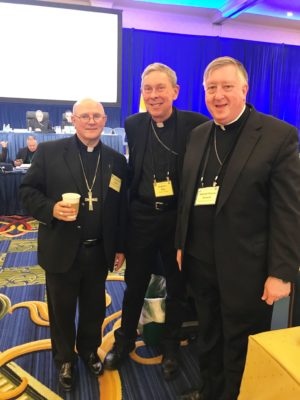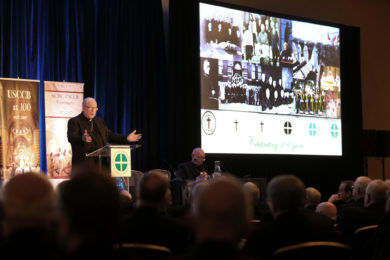November 15, 2017
Bishop Rozanski reflects on issues raised, friendships renewed at fall assembly
REGIONAL
By Rebecca Drake

Springfield Bishop Mitchell Rozanski (right) poses with fellow Bishops Michael Warfel and Stephen Berg during the recent fall assembly of the United States Conference of Catholic Bishops. (IObserve photo/courtesy of Bishop Mitchell Rozanski)
SPRINGFIELD – As he prepared to head to Indianapolis for the National Catholic Youth Conference, Springfield Bishop Mitchell T. Rozanski shared his responses to the United States Conference of Catholic Bishops’ (USCCB) annual fall general assembly held Nov. 13 and 14 in Baltimore.
Speaking to iObserve by telephone, Bishop Rozanski said the bishops spent a significant amount of time focusing on the two main agenda items of racism and immigration and as the USCCB marked its 100th anniversary, the history and the current topics converged.
“So, in light of those two topics, we also reflected on why the bishops’ conference came about and really it was born in the crisis that was engendered by World War I, the concern for ministering to the Catholic troops who were fighting in World War I, making sure that they had chaplains; and then also responding to the refugees who moved out of their homelands after World War I,” Bishop Rozanski said. “So, the bishops’ conference has always had a history of responding to the needs of the day and trying to deal with those needs in the best way possible.”
Bishop Rozanski said he especially appreciated a workshop on the centenary of the USCCB held on Nov. 12, the day before the opening of the fall assembly. The workshop featured talks by New York Cardinal Timothy M. Dolan; Bishop Earl A. Boyea of Lansing, Michigan; and retired Bishop William S. Skylstad of Spokane, Washington.
As detailed during the Nov. 12 workshop for the bishops, the USCCB began in 1917 as the National Catholic War Council, founded to coordinate Catholic response to the war, including recruitment of military chaplains and a focus on displaced people and child welfare. In 1919, the war council became the National Catholic Welfare Council and in 1922, was changed to National Catholic Welfare Conference.
As reported by Catholic News Service, in 1966 the structure was revamped to form the U.S. Catholic Conference as the public policy successor to the NCWC and to create the National Conference of Catholic Bishops as the episcopal conference called for by the Second Vatican Council. In 2001, after a reorganization process, the twin conferences were merged into the USCCB.
“So, it was good to reflect upon what the hundred years have been like and also good to see that we’re still on the forefront of the issues of our day in giving moral guidance and in trying to address those issues,” Bishop Rozanski said. He specifically cited the work of the Springfield Diocese’s Catholic Charities Agency in carrying out the bishops’ mission of addressing important social issues.
“I look at what Catholic Charities is doing for immigrants, really continuing in the fine tradition that the bishops’ conference has had in working with immigrants and in trying to get them resettled,” he said, “particularly now the refugees, those that are fleeing war-torn lands, who no longer are safe in the lands they have grown up in, need to look for other places to live.
“So, we’re responding to the needs today of the refugees particularly,” said Bishop Rozanski. “And probably at no other point in our world’s history were there the number of refugees that we have today, because of the different conflicts, particularly in the Middle East and in Africa.”

New York Cardinal Timothy M. Dolan speaks during a Nov. 12 presentation in Baltimore on the centenary of the U.S. Conference of Catholic Bishops. It was held the day before the bishops opened their fall general assembly. (CNS photo/Bob Roller)
While the bishops addressed a myriad of issues at the conference, including evangelization, marriage and family ministry, and reviewing of catechetical texts, Bishop Rozanski said the overall experience was one of support and fraternity.
“Being from all over the United States, we all face different situations and different issues in the church,” he said. “So, we have bishops here who are recovering from the hurricanes, their dioceses and neighborhoods and churches are recovering from the hurricanes. Other bishops from California have been affected so adversely by the wildfires, by the forest fires – and many of their people are homeless because they’ve been burned out of their homes.
“I think of Bishop Herbert Bevard from the Virgin Islands, who told me that he thinks the rest of his time there as bishop, the next three or four years, will be spent in trying to rebuild islands that have been so devastated. He’s responsible for the islands of St. Thomas, St. John and St. Croix.”
But in spite of the challenges facing bishops from throughout the nation, Bishop Rozanski said they find unity in a common purpose.
“I feel that as the conference was born out of crisis and the bishops came together to deal with that crisis, I find the bishops today very unified in the way that we wish to proclaim the Gospel,” he said, “we wish to speak out on behalf of immigrants, to speak out against racism, to speak out for religious freedom in our country and in the world, and in our concern for Christians who are in danger throughout the world because of being Christian.”
“So, there are many things that unite us and our voice as we come together as a conference despite the fact that we come from so many diverse areas of the country,” he said, “and we all have very different issues to face in those very diverse areas. But what energizes me is when we as a conference of bishops can speak out in one voice.”
Not least of all, Bishop Rozanksi said he appreciates the chance to spend time with friends at the fall bishops’ meeting.
“It’s good to be able to renew friendships and catch up with so many bishops, to inquire how they’re doing in their dioceses – the sharing that takes place among the bishops, the solidarity and fraternity,” he said. “And that is very keenly sensed here, I’m sure, by the other bishops as well, and the fact that we are willing to grapple with the very tough issues that we face as a church and that we face as a nation.”
Material from Catholic News Service was used in this report.


 Facebook
Facebook Youtube
Youtube
